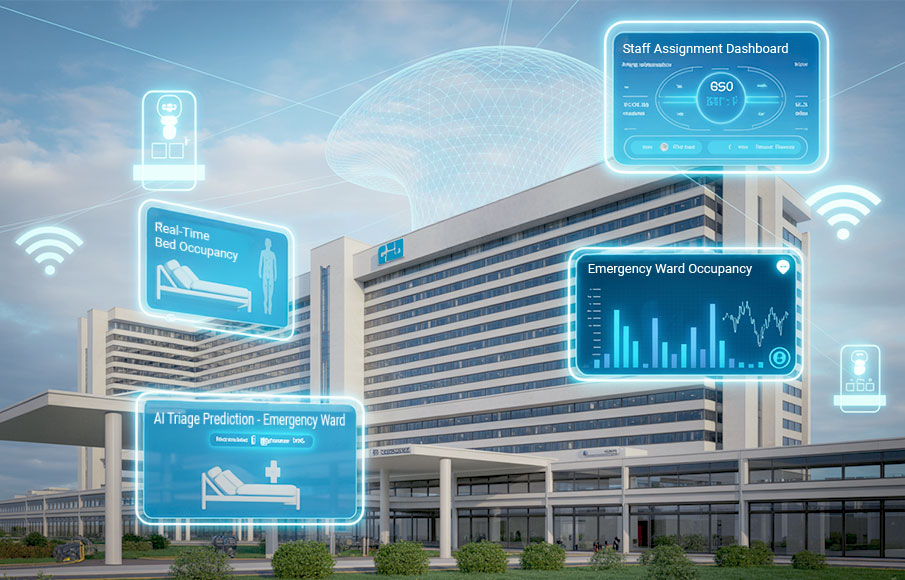What are Managed Services? End-to-End IT Solution for 2025
- 12 January 2024

Businesses face mounting pressure to optimise IT infrastructure while navigating increasing complexity and security risks. Managed Services Providers (MSPs) offer a strategic solution by delivering comprehensive IT services, including network management, application support, infrastructure maintenance, and security.
Gartner defines MSPs as entities providing continuous support and administration regardless of infrastructure location—whether hosted by the MSP, a third-party, or the customer. This “end-to-end” approach allows businesses to reduce operational costs, enhance security, and increase agility and scalability by outsourcing these critical IT functions. MSPs are thus a valuable solution for businesses seeking to optimise IT operations and drive strategic growth. Read on to discover how managed services can transform your business’s IT landscape.
What are Managed IT Services?
Simply put, Managed Services are operational management tasks such as the management of hardware and software, including proactive monitoring, fault management, change management and lifecycle management. These services, which often incorporate cloud computing solutions, are provided by an external managed service provider (MSP) to ensure efficient operations while allowing customers to maintain visibility through an intuitive dashboard.
In a managed services model, the vendor provides the hardware, software, and professional services according to every business needs. They could help you set up, maintain and troubleshoot network problems when needed, so that business operations could be relieved from knowing the how-to of every device or application, and focus on your core operations and business growth.
What can a Managed Service Provider (MSP) offer?
Before employing the services of a managed services provider, you should know what services they owe you and what is within their power, limit, or jurisdiction to offer. Below are some of the services you can expect from an MSP.
1. Professional services
With the ongoing evolution and increasing complexities in networking, information technology and ever-increasing security vulnerabilities, businesses need more highly skilled personnel with a vast range of knowledge and skills to manage the network infrastructure securely and more efficiently to adapt and support the changing networking scenarios (e.g. Public/Hybrid/Private Clouds, employee work from home which requires remote monitoring and access etc.). MSPs as a single point of contact will offer these professional services ranging from network design consultation to installation and configuration, and to the ongoing change management and maintenance of the network appliances and, in some cases, tech refresh to migrate the entire network to more advanced platforms that meets your business needs.
2. Options of vendors and products for different business needs and budgets
Business customers can tap on managed service providers’ domain knowledge across multiple platforms and years of project and service management experience to save time and resources in building the network/system from scratch and setting up support teams to standby round-the-clock etc. Their IT department can then focus on doing the overall solution design and managing MSPs.
3. People talents
MSPs work with highly skilled engineering professionals that will offer the latest insights and new technologies in network management and security operations. They are certified and experienced solution consultants, engineers, as well as project and service managers who are available to provide support to business clients in right sizing the network and system, as well as ongoing round-the-clock operations support. This also creates more predictability, thereby reducing operational risk and increasing the chance of success in trying new and innovative solutions as well as in implementing network migrations.
4. Integrated technical support
Appliances don’t function alone, they are linked through dedicated or shared connectivity. Telco MSPs can provide one-stop shop support for customers’ end to end network across both the Local Area Network LAN And Wide Area Network WAN more effectively and efficiently.
Network appliances also require regular updates such as security patches and missing a critical system update may expose the corporate network to cybersecurity attacks. MSPs provide ongoing change management support including evaluating change impact analysis of critical network updates with the customer.
In addition, few MSPs may be able to provide managed security services such as vulnerability assessment, proactive cyber threat monitoring, so that’s additional assurance on overall network-related service availability,
5. Improved Total Cost of Ownership
With the support of an MSP, organisations can minimise upfront investment and budget required to bring business operation plans to fruition. It also reduces the cost and time required to upgrade and maintain your own set-up or professional services team. With streamlined management by the MSP, businesses no longer need to set aside additional resources to service equipment from multiple brands and different software licences. The MSP will be able to take care of this and provide a single point of contact for simplified operation processes.
If an organisation does not have the depth of skillset within the IT team to manage complex network operations, leveraging MSPs can help reduce the burden of sourcing for and hiring talent. Allowing businesses to focus more of their HR efforts on hiring talent to support their core business requirements.
In summary, the above gives a boost to productivity and profitability; your organisation can better focus manpower on the most crucial aspects of your business.
Why do we need a Managed Services Provider?

Are you wondering why your organization should switch from using your in-house team to working with managed services providers? Below are some reasons to consider.
1. IT outsourcing
With the current surge and development of new technologies and business processes, IT outsourcing has now become a norm. Many businesses have embarked on the journey of digital transformation, including wide use of apps and IoT devices, process automation as well as digitised information exchange. This has put tremendous pressure on the IT department, which is already short of skilled IT personnel and time to attend training sessions to manage upgrades and replacements.
In addition to an increased number of connected devices and apps, there is also a significant increase in operational support, such as repair, update, and maintenance. Outsourcing part of the IT operation functions, such as the supervision of the network, to reliable partners with agreed service level assurance, has been proven both successful and cost-effective.
2. Flexible financing options
The flexible financing options offered by MSPs amortise upfront cash-payout over a contract period, which could help businesses free up more cash for business operation and to focus on more strategic projects.
3. Valuable product and project experience
MSP’s knowledge of the products and solution plus customer project experience can be valuable to a business client who is exploring new solutions to meet their business needs, such as new business development, expansion, or migration of existing setup.
Tips on selecting a managed services provider (MSP)

Before you choose a managed services provider, you want to be sure of the value they’ll deliver once you’re signed up. Below are a few things to look out for:
1. Accountable Service-level agreement (SLA)
The SLA serves as a commitment offered by the MSP to the customer, in managing customers’ networks, including service availability, such as mean fault resolution time, support for wee hour requirements such as system updates, maintenance, and hardware replacement.
2. Create an action plan that matches operational goals
One of the best practices that managed service organisations are tasked with is the duty of strategic management. The MSP will help you plan your network infrastructure such as scaling and growing your networking needs according to your business needs.
3. A good track record
How have they provided value to their existing client base? How have other organisations fared while working with them? Do they have or talk about the resources needed to implement network best practices? If the answers to all these strategic questions about the MSP are positive, then you can give them a call. You might also want to look out for vertical experience, industry recognition (awards and accolades), implementation of complex customer projects.
4. Network management and cybersecurity capabilities
The managed services provider’s capability in the area of network management and cybersecurity capabilities, including their expertise in cloud security and data protection measures, to achieve higher availability and reliability are crucial to business clients. This assures the companies that the MSP can provide wider service scope and take on greater responsibility in resolving more complex issues which are affecting the end-user service.
Business Class Managed IT Services

At SPTel, we believe in going a step further to deliver a truly business-grade standard of service quality for our customers. That is why, besides delivering the usual managed services functions, we have further invested in enhancing our capabilities to enable more scalable, flexible, and secure network management.
A Complete Cycle of Managed Support Services
We provide a comprehensive suite of certified professional managed services, from network design proposals to recommendations of vendor solutions to proof-of-concept testing to implementation and migration to service monitoring, maintenance, and change management, security patches and upgrades all by certified solution consultants, engineers, project managers and service managers. Our team of experts has rich industrial experience in the implementation of large, complex, or bespoke solutions in both the public and private sectors.
Intelligent Network with Integrated Operation Centre
SPTel is the first and only service provider in Singapore to provide connectivity services through an advanced end-to-end software-defined IP network that is built on high speed, robust, and diverse fiber paths to deliver high availability internet or MPLS services. Paired with our professional managed services, our 24×7 support centre will be able to quickly identify the fault segment by remotely accessing the critical network nodes for a faster turnaround time for fault response.
Excellent Partnership
We work closely with market leaders in technology, platform, and solutions; our strong relations with technology partners allow us to bring the latest proven solution to our customers at competitive costs. Our engineers conduct vigorous tests and certifications on the products we sell to ensure stability and interoperability and continue to improve the service delivery experience to customers.
Our Capability in Cybersecurity
Closely monitoring and maintaining network infrastructure and systems also includes tackling imminent security breaches promptly. We will work round the clock to reduce the risk of security challenges. By being proactive to tackle cybersecurity challenges, we will help to increase agility, flexibility, and performance of business processes.
SPTel’s End-to-End Managed Services for IT Operations
Streamline your IT operations with SPTel’s comprehensive end-to-end managed services, covering everything from network and telecom management to robust security, edge cloud computing, and IoT solutions.
| Managed Network Services | Simplify your network management with our team of experts supporting your business needs. Our products include Managed CPE Services, Managed Wireless LAN, and Managed SD-WAN Solutions. |
| Managed Mobility Services | Get diversity for your mobile and M2M requirements with our Business Mobile Broadband and Multi-Network Data Solution (M2M and IoT SIM card). |
| Managed Security Services | Take the hassle out of your cyber security management with our Managed DDoS Protection, Managed Perimeter Protection, and Managed Web Application Firewall. |
| Edge Cloud | SPTel’s Edge Cloud Computing solution supports the anticipated trends for distributed IT/data analytics services, especially in IoT & 5G deployments. |
| IoT-as-a-Service Platform | SPTel is the first provider in Singapore to offer IoT-a-a-S on a subscription-based model to allow businesses to reap IoT benefits without hefty set-up costs. |
The Bottom Line – Managed IT Services

You no longer have to work with multiple providers to tackle the complexity of network performance; SPTel’s managed services offer a complete solution set for your on-site customer premise equipment needs, remote support, and cyber security as a single package, catering to your network connectivity needs (both LAN and WAN).
Find out more about SPTel’s Managed Services or contact us for enquiries.












